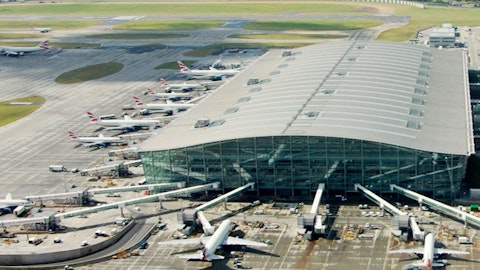Of course a challenge moment is going to be the summer because Canada does not travel in summer. So the only engine or the only support should have to come from the U.S.
Guilherme Mendes: Okay. That’s clear. Thank you. Have a good day.
Operator: Our next question is from Alberto Valerio with UBS. Please proceed.
Alberto Valerio: Hi. Thank you for taking my question, Adolfo. My question is more on the bottom line. Against our projections and also year-over-year, we will see higher financial results. I would like to know if you have any non-recurring events on the line, that’s it. Thank you.
Adolfo Castro: Sorry, but your sound is really bad. I cannot understand your question, Alberto.
Alberto Valerio: I’ll try again. Just if you have any non-recurring events on financial results.
Adolfo Castro: I cannot hear you.
Operator: I believe it was any more current events on financial results.
Adolfo Castro: Sorry?
Operator: Any more current events on the financial results.
Adolfo Castro: Well, the exchange rate is going to be extremely important for us. You have seen some adjustment during the last two weeks and that has to do with international traffic in our case as you have seen for the first quarter. If you see the growth in our optimal revenue for the first quarter, that probably was a surprise to you, but that has to come with a difference between the 6.8 million and 6.2 million passengers in terms of international passengers in the first quarter. So, the exchange rate is crucial.
Operator: Our next question is from Anton Mortenkotter with GBM. Please proceed.
Anton Mortenkotter: Hi, Adolfo. Thank you. Thank you for the call and congrats on the results. I have two quick questions. One is related to trade receivables. I was just wondering what the dynamics are seeing this quarter and why did that increase so much. And the second one is regarding capital allocation. Understanding that even when accounting for the high CapEx and commitments for this year and also for the already announced dividends, the net cash position seems to be set to continue increasing during the year. Could we expect an additional announcement on a dividend or is there anything that’s been thought about on that front?
Adolfo Castro: In the case of trade receivables for the quarter, you can see a very nice adjustment or decrease in the case of Puerto Rico. That has to do with the recuperation of the result of the trial we had there, the 2% of the fuel flowage. In terms of Mexico, that has to do with the normal operation and the same in the case of Colombia. In terms of capital allocation, we ended the quarter with MXN 17 billion. The dividends that are proposed for tomorrow’s shareholders meeting will be, roughly speaking, 6.6, 6.7. So then we have to see the CapEx. But as I said in the initial remarks, we’re trying to be, on one side, very supportive on the growth. As you know, we have a MXN 29 billion CapEx for the next five years. But on the other side, we are paying these extraordinary dividends this year, which is almost the same as it was last year.
Anton Mortenkotter: Thank you.
Operator: Our next question is from Juan Mercado [ph] with GBM. Please proceed.
Unidentified Analyst: Hi, Adolfo. Thanks for the call and congrats on the results. My first question would be a follow-up on a previous question regarding tariffs. You mentioned that the first quarter, there wasn’t an adjustment for the new max tariff. Do you mean by this that there was only a partial adjustment or was there none at all?
Adolfo Castro: There were no adjustments on the first quarter.
Unidentified Analyst: All right, that’s very clear. Thank you. And just an additional question. You mentioned that on the 1st of April, you would do this adjustment. Is this for the 100% of the maximum tariff or at what level should we expect this adjustment?
Adolfo Castro: Well, of course, it’s not the 100%. It would have to be less than that. The most, again, critical point would be the situation of the exchange rate. As I mentioned, 150% of the traffic is international and those pay in U.S. dollars.
Unidentified Analyst: Yes. All right, that’s very clear. Thank you, Adolfo.
Adolfo Castro: You’re welcome.
Operator: Our next question is from Fernanda Recchia with BTG. Please proceed.
Fernanda Recchia: Hi, thank you. Adolfo, and congrats on the results. Two follow-up questions on our side. The first, regarding traffic outlook, you provided an outlook for Mexico, but could you comment a little bit more on Puerto Rico and Colombia? As you spoke on your initial remarks, Colombia started to see a normalization. How should we expect the traffic for the year-end? And Puerto Rico, do you expect a slowdown on the double-digit growth pace that they are posting? And my second question is on commercial revenues. As you mentioned on our initial remarks, it’s reached close to 125 on a consolidated basis. How should we expect this indicator to move along the year? Do you expect, as you deploy more capital in Mexico, to increase the Mexico ratio? Thank you.
Adolfo Castro: Well, in the case of the traffic for Puerto Rico and Colombia, both will be, in my opinion, normalized during the year. One that has to do with the bankruptcy of the tour lanes in February last year. In that sense, we saw the first quarter negative of 2%, but we see on a monthly basis, we saw an increase of 9% for the month of March. So I hope, what I’m expecting is, this to continue throughout the end of the year and then that we are able to recuperate what we have lost from these two islands. In the case of Puerto Rico, the normalization goes exactly the opposite because last year we had a very nice increase when the frontier got into the island and that’s why we show a very high traffic last year about 20s which is not normal.




